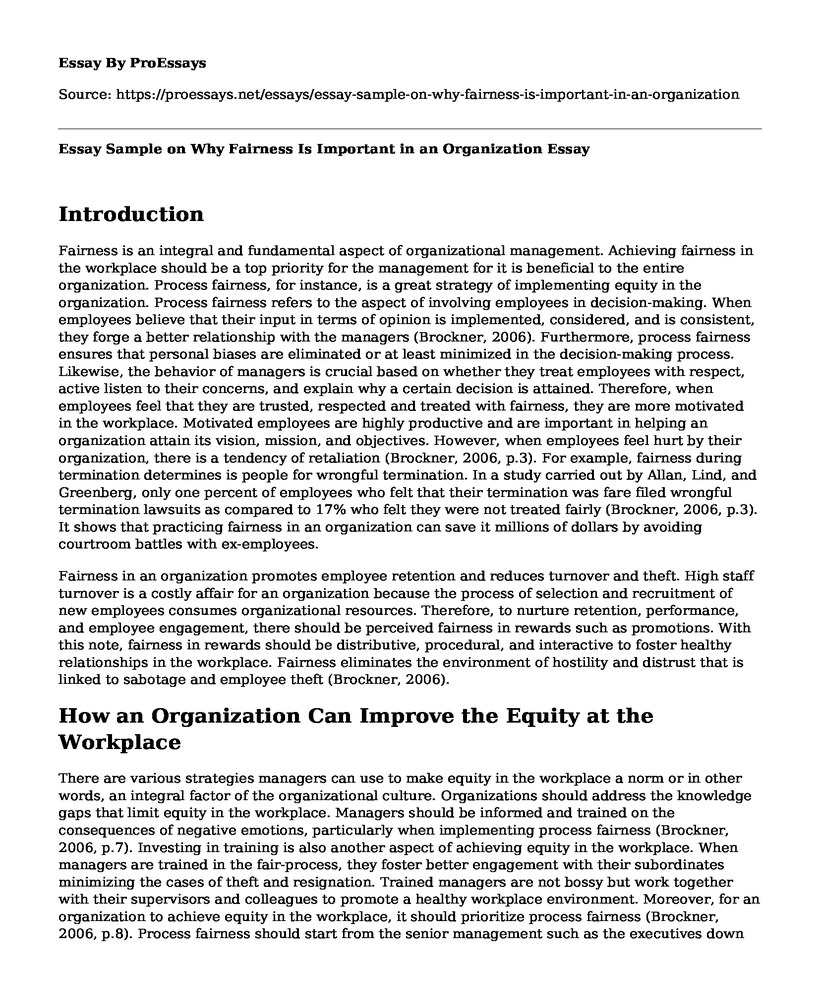Introduction
Fairness is an integral and fundamental aspect of organizational management. Achieving fairness in the workplace should be a top priority for the management for it is beneficial to the entire organization. Process fairness, for instance, is a great strategy of implementing equity in the organization. Process fairness refers to the aspect of involving employees in decision-making. When employees believe that their input in terms of opinion is implemented, considered, and is consistent, they forge a better relationship with the managers (Brockner, 2006). Furthermore, process fairness ensures that personal biases are eliminated or at least minimized in the decision-making process. Likewise, the behavior of managers is crucial based on whether they treat employees with respect, active listen to their concerns, and explain why a certain decision is attained. Therefore, when employees feel that they are trusted, respected and treated with fairness, they are more motivated in the workplace. Motivated employees are highly productive and are important in helping an organization attain its vision, mission, and objectives. However, when employees feel hurt by their organization, there is a tendency of retaliation (Brockner, 2006, p.3). For example, fairness during termination determines is people for wrongful termination. In a study carried out by Allan, Lind, and Greenberg, only one percent of employees who felt that their termination was fare filed wrongful termination lawsuits as compared to 17% who felt they were not treated fairly (Brockner, 2006, p.3). It shows that practicing fairness in an organization can save it millions of dollars by avoiding courtroom battles with ex-employees.
Fairness in an organization promotes employee retention and reduces turnover and theft. High staff turnover is a costly affair for an organization because the process of selection and recruitment of new employees consumes organizational resources. Therefore, to nurture retention, performance, and employee engagement, there should be perceived fairness in rewards such as promotions. With this note, fairness in rewards should be distributive, procedural, and interactive to foster healthy relationships in the workplace. Fairness eliminates the environment of hostility and distrust that is linked to sabotage and employee theft (Brockner, 2006).
How an Organization Can Improve the Equity at the Workplace
There are various strategies managers can use to make equity in the workplace a norm or in other words, an integral factor of the organizational culture. Organizations should address the knowledge gaps that limit equity in the workplace. Managers should be informed and trained on the consequences of negative emotions, particularly when implementing process fairness (Brockner, 2006, p.7). Investing in training is also another aspect of achieving equity in the workplace. When managers are trained in the fair-process, they foster better engagement with their subordinates minimizing the cases of theft and resignation. Trained managers are not bossy but work together with their supervisors and colleagues to promote a healthy workplace environment. Moreover, for an organization to achieve equity in the workplace, it should prioritize process fairness (Brockner, 2006, p.8). Process fairness should start from the senior management such as the executives down the chain of command in an organization. Senior managers should endorse a two-way communication channel by explaining about their strategic decisions to mid-level managers and their employees as well. As such, the management should communicate to the employees about possible or expected change and ensure that employees are respected as a means of promoting equity in all levels of an organization. On the other hand, management should reaffirm their commitment to equal opportunities and recognition among employees. The sense of unequal recognition is one of the fastest ways of eroding a sense of fairness in the workplace (Brockner, 2006). Therefore, when employees perceive that promotions are handled fairly, there is a healthy engagement with co-workers and management without cases of retaliation and resignation.
Reference
Brockner, J. (2006). Why it's So Hard to be Fair. Harvard Business Review, 1-10.
Cite this page
Essay Sample on Why Fairness Is Important in an Organization. (2022, Nov 25). Retrieved from https://proessays.net/essays/essay-sample-on-why-fairness-is-important-in-an-organization
If you are the original author of this essay and no longer wish to have it published on the ProEssays website, please click below to request its removal:
- Evaluation Essay on Apple Inc
- The North Face Brand Analysis Report
- Essay Sample on Leadership and Team Building
- Essay Example on Performance Management: A Year-Round Comm Process
- Critical Essay on Commitment: Graphic Novel on Managing Project Risk
- Paper Example on Creating a Business Plan for a Start-up Bistro/Coffeehouse
- Annotated Bibliography Example on Mobile Security Technology: Protection for Mobile Users







